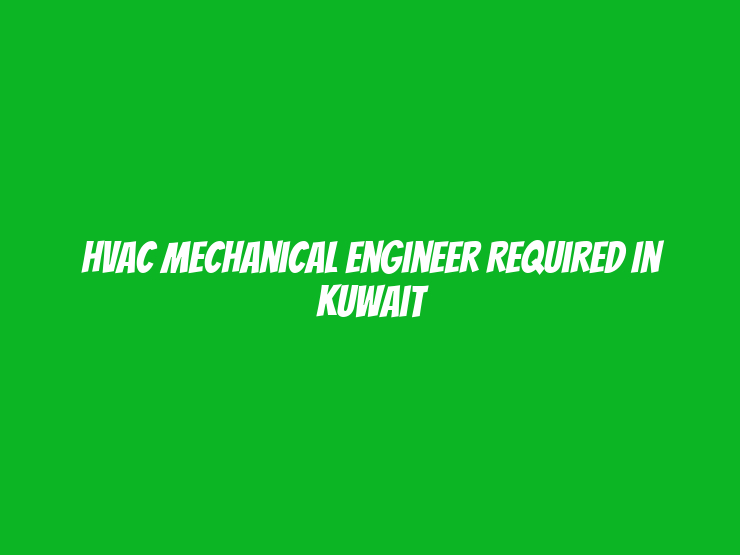An HVAC Mechanical Engineer is responsible for designing, installing, and maintaining heating, ventilation, and air conditioning (HVAC) systems in residential, commercial, and industrial buildings. This role involves ensuring that HVAC systems function efficiently, meet safety standards, and are in compliance with local building codes. The HVAC Mechanical Engineer plays a crucial role in energy efficiency, indoor air quality, and maintaining comfort in various environments. They must possess a strong understanding of thermodynamics, fluid mechanics, and material science to ensure optimal system performance.
Dua for Job Seeking: اللهم يسر ولا تعسر واكمل ولا تكل وبارك لي فيما قَدَّرت
| Salary | Market Competitive |
| Experience | 2 – 5 years |
| Location | Kuwait |
| Qualification | Bachelor’s Degree |
| Posted | 18 September 2024 |
| Job Type | Full-Time |
| Posted by | Habeebi Recruiter |
| last date to apply | apply within 15 days |
Responsibilities:
1. Design and Development of HVAC Systems
The HVAC Mechanical Engineer is responsible for designing HVAC systems that meet the specific needs of buildings, ensuring proper temperature regulation, humidity control, and air quality. This involves calculating heating and cooling loads, selecting appropriate equipment, and creating detailed design plans using computer-aided design (CAD) software. The engineer also considers factors such as energy efficiency, sustainability, and building regulations during the design process.
2. Oversee Installation and Commissioning
The HVAC Mechanical Engineer supervises the installation of HVAC systems to ensure that they are correctly installed according to design specifications. This includes coordinating with contractors, reviewing installation plans, and ensuring that the system components—such as ducts, compressors, and air handlers—are installed safely and efficiently. Once installation is complete, the engineer commissions the system, testing its performance and ensuring that it meets the required operational standards.
3. Conduct System Evaluations and Upgrades
Regular evaluation and maintenance of HVAC systems are essential for long-term performance. The HVAC Mechanical Engineer is responsible for conducting periodic inspections to assess system efficiency, identify wear and tear, and troubleshoot any issues. They may also recommend upgrades to improve energy efficiency, reduce operational costs, or extend the life of the system. These upgrades may include installing energy-efficient equipment or incorporating smart technologies that optimize system performance.
4. Ensure Compliance with Codes and Regulations
An important aspect of the role is ensuring that all HVAC designs and installations comply with local, national, and international building codes and standards. The HVAC Mechanical Engineer must stay updated on relevant regulations and safety standards, such as ASHRAE (American Society of Heating, Refrigerating and Air-Conditioning Engineers) standards. They are responsible for ensuring that all HVAC systems meet these requirements to avoid penalties, ensure safety, and promote environmental sustainability.
5. Energy Efficiency and Sustainability Solutions
Energy efficiency is a significant concern in modern building design. The HVAC Mechanical Engineer develops strategies to minimize energy consumption while maintaining optimal system performance. This may involve selecting energy-efficient equipment, designing systems that use renewable energy sources, and implementing energy recovery ventilation systems. Sustainability practices also include reducing the environmental impact of HVAC systems by selecting materials and equipment that meet green building certifications.
6. Provide Technical Support and Troubleshooting
The HVAC Mechanical Engineer offers technical support to contractors, facility managers, and maintenance teams. When system issues arise, the engineer provides troubleshooting assistance to diagnose and resolve problems. This may involve analyzing system data, inspecting equipment, and recommending solutions such as repairs, replacements, or modifications. The engineer must also respond to emergencies, such as system failures, to minimize downtime and ensure continuous operation.
7. Prepare and Manage Project Documentation
Effective documentation is essential for managing HVAC projects. The HVAC Mechanical Engineer is responsible for preparing technical drawings, specifications, and reports throughout the project lifecycle. This documentation includes material lists, installation guidelines, operation manuals, and maintenance schedules. Proper documentation ensures that all stakeholders, including contractors and clients, have a clear understanding of the system’s design, functionality, and maintenance requirements.
8. Collaborate with Other Engineers and Architects
The HVAC Mechanical Engineer works closely with other engineers, such as electrical and structural engineers, as well as architects and project managers. This collaboration ensures that HVAC systems are seamlessly integrated into the overall building design. The engineer must communicate effectively with these teams to coordinate design plans, address potential conflicts, and ensure that all systems function harmoniously within the building’s infrastructure.
Skills and Qualifications:
- Bachelor’s degree in Mechanical Engineering or a related field.
- Extensive knowledge of HVAC system design, installation, and maintenance.
- Proficiency in HVAC software tools, such as AutoCAD, Revit, and HAP (Hourly Analysis Program).
- Strong understanding of thermodynamics, fluid mechanics, and heat transfer principles.
- Familiarity with building codes and HVAC standards (e.g., ASHRAE, LEED).
- Excellent problem-solving and troubleshooting abilities.
- Strong project management and organizational skills.
- Ability to work collaboratively with multidisciplinary teams.
- Certifications such as Certified HVAC Designer (CHD) or Professional Engineer (PE) are an advantage.
How to apply:
Send your updated resume to our email:
Email: hrdkw@career- hunters.com
Disclaimer:
- We list jobs submitted by employers. HabeebiRecruiter.com does not verify employers or guarantee job details.
- Be aware: legitimate jobs never require upfront payment
